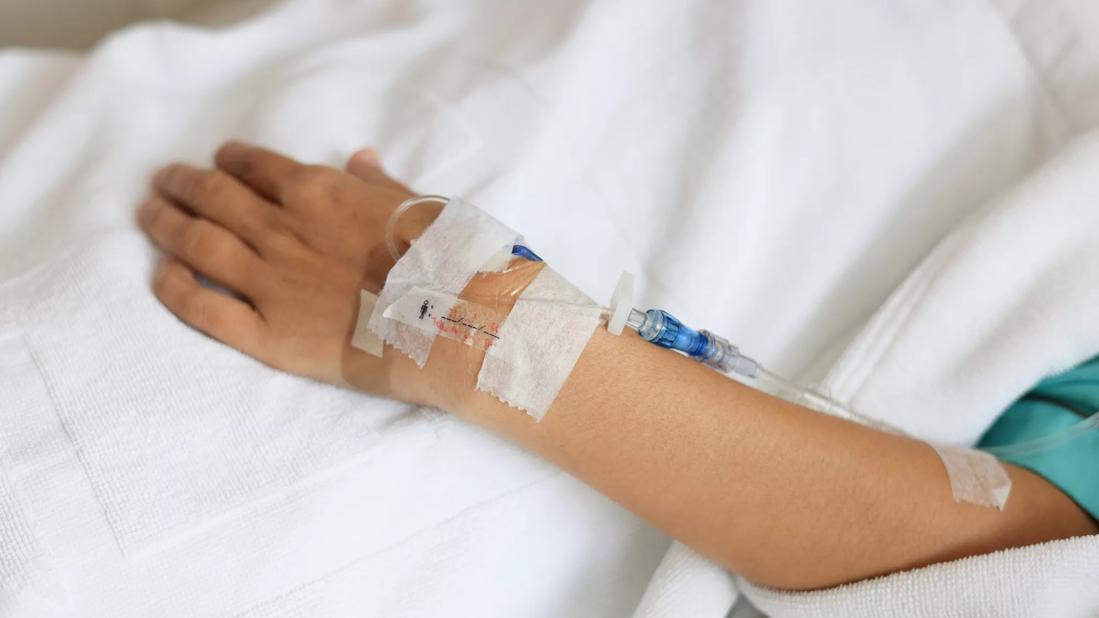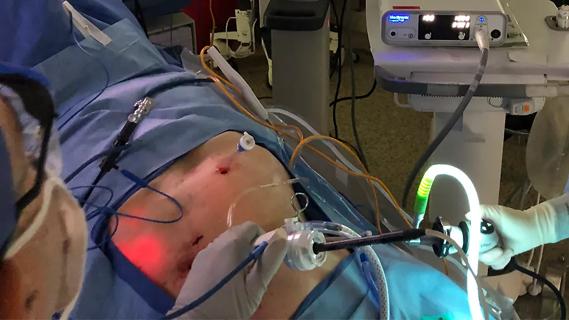Reviewing how the drug can be incorporated into care

Written by Stephanie N. Bass, PharmD, Aanchal Kapoor, MD and Christina C. Lindenmeyer, MD
Advertisement
Cleveland Clinic is a non-profit academic medical center. Advertising on our site helps support our mission. We do not endorse non-Cleveland Clinic products or services. Policy
Note: This article is a slightly abridged version of a review first published in the Cleveland Clinic Journal of Medicine (2023;90(11):664-667). The full-length, open-access version with included tables and graphs is available here.
With careful patient selection, terlipressin, a synthetic analogue of vasopressin, is an effective therapy for hepatorenal syndrome (HRS). The drug has compared favorably with placebo and, based on limited data, other vasoconstrictors.
HRS is a serious complication of advanced liver disease defined by kidney dysfunction associated with complex changes in the splanchnic circulation resulting in vasoconstriction and renal hypoperfusion.1 Traditionally, acute HRS, characterized by a rapid decline in kidney function, has been referred to as type 1 HRS; chronic HRS, characterized by progressively worsening kidney function, has been referred to as Type 2 HRS.2
The diagnostic criteria for HRS were revised recently based on the International Club of Ascites definition of acute kidney injury (AKI) in patients with cirrhosis.1 The updated definition addresses the potential overestimation of renal function based on the serum creatinine (SCr) level in patients with cirrhosis, where SCr is reduced because of malnutrition and muscle wasting.2 The revised definition reclassifies Type 1 HRS as HRS-AKI and type 2 HRS as HRS-chronic kidney disease.2 HRS-AKI is considered a diagnosis of exclusion.
The ultimate therapy for HRS-AKI may be liver transplant in appropriate candidates. However, because AKI is associated with significantly increased mortality risk,3 therapies are needed that target reversal of HRS-AKI and potentially serve as a bridge to liver transplant. Unfortunately, there are limited treatment options for HRS-AKI. Current therapies include the combination of midodrine and octreotide, norepinephrine and terlipressin.
Advertisement
Terlipressin, available in some parts of the world for several years, was just recently approved by the U.S. Food and Drug Administration (FDA). It is the only drug with an FDA-labeled indication for the treatment of HRS-AKI. The 2021 American Association for the Study of Liver Diseases and the 2018 European Association for the Study of the Liver guidelines both recommend terlipressin in combination with albumin as first-line treatment for patients with HRS-AKI.4,5
Terlipressin has been compared with placebo and with other vasoconstrictors. The efficacy and safety of terlipressin for HRS reversal was demonstrated in CONFIRM (Terli pressin Plus Albumin for the Treatment of Type 1 Hepatorenal Syndrome),6 a multi-center, randomized, placebo-controlled, double-blind study that led to the FDA approval of terlipressin. It included patients with cirrhosis, ascites, and type 1 HRS, defined as an SCr of at least 2.25 mg/dL without improved renal function within 48 hours of discontinuing diuretic therapy and administration of albumin.6 CONFIRM was designed before the new International Club of Ascites AKI definition, so enrolled patients generally had higher SCr levels than would qualify for inclusion based on the new HRS-AKI definition (mean SCr 3.5 mg/dL). Further, patients may have been excluded from CONFIRM who would now qualify for treatment based on the updated HRS-AKI definition.
CONFIRM exclusion criteria included an SCr greater than 7 mg/dL, shock, large-volume paracentesis (> 4 L) within 48 hours of randomization, and uncontrolled bacterial infection. Concomitant vasopressors were not permitted. Patients were randomized to receive either terlipressin (N = 199) at an initial dose of 1 mg terlipressin acetate (equivalent to 0.85 mg terlipressin) every six hours or placebo (N = 100). Doses were adjusted based on clinical response according to prescribing-information guidelines.7 Both treatment arms received daily albumin replacement (median 335 g including 1 g/kg body weight for two days prior to receiving the study drug and on day 1, followed by 20–40 g/day while on the study drug) for a median duration of five days.
Advertisement
The primary outcome in CONFIRM was verified reversal of HRS, defined as two consecutive SCr values of 1.5 mg/dL or less and survival without need for renal replacement therapy for 10 days. This occurred in 32% of patients in the terlipressin group compared with 17% of patients in the placebo group (P = .006). In addition, HRS reversal without need for renal replacement therapy for 30 days occurred in 34% of terlipressin patients compared with 17% of placebo patients (P < .001). However, there was no difference in 90-day mortality rates (51% terlipressin vs 45% placebo, 95% confidence interval [CI] −6 to 18), nor was there a difference in liver transplant rates (23% terlipressin vs 29% placebo).6
Terlipressin was associated with an increased risk of abdominal pain, nausea, diarrhea, and respiratory failure (14% terlipressin vs 5% placebo). In post hoc analyses, populations that were potentially more likely to benefit from terlipressin for HRS reversal included patients with systemic inflammatory response syndrome at baseline, mean arterial pressure less than 70 mm Hg at initiation, and alcohol-associated hepatitis as the cause of cirrhosis.6
The comparative efficacy of norepinephrine and terlipressin was evaluated along with daily albumin replacement in 120 patients with HRS-AKI in a 2020 randomized, open-label trial.8 The study included patients who met the recently updated International Club of Ascites criteria for HRS. Consequently, patients in this study had lower SCr levels at initiation than in CONFIRM (mean 1.79 mg/dL in the terlipressin group vs 2.02 mg/dL in the norepinephrine group), so this study may reflect earlier initiation of HRS therapy.1 The study was conducted in India, where terlipressin was administered as a continuous intravenous infusion, whereas in the United States, FDA-approved dosing is intermittent intravenous administration. Compared with norepinephrine, terlipressin administration was associated with improved reversal of HRS (40% vs 16.7%, P = .004), reduced need for renal replacement therapy (56.6% vs 80%, P = .006), and improved 28-day survival (48.3% vs 20%, P = .001). The rate of adverse effects was significantly higher with terlipressin (23.3% vs 8.3%, P = .02), and effects were mainly gastrointestinal.
Advertisement
In a 2015 randomized trial conducted in Italy, terlipressin was administered by continuous infusion to 27 patients, and 22 patients received midodrine and octreotide; both groups also received albumin.9 Patients who received terlipressin had higher rates of HRS reversal (19 of 27, or 70.4%) compared with those who received the combination of octreotide and midodrine (6 of 21, or 28.6%, P = .01).
Finally, despite limited prospective data comparing terlipressin with other vasoconstrictors, a recent meta-analysis of 26 HRS trials concluded that terlipressin is associated with greater HRS reversal compared with midodrine-octreotide (72.5 more reversals per 1,000; 95% CI > 198 to < 12) and norepinephrine (30.4 more reversals per 1,000; 95% CI > 83 to < 14.6).100 Based on these data, terlipressin may be more effective than norepinephrine and is likely more effective than the combination of midodrine and octreotide, a conclusion supported by consensus guideline recommendations.4,5
Terlipressin is recommended as a first-line treatment of HRS-AKI and has demonstrated efficacy for HRS reversal over other therapies, but its use is not without hazard. It is associated with respiratory failure, especially in the setting of albumin administration. Other comorbidities can increase the risk of respiratory failure and should be addressed before using terlipressin.6, 11, 12
The risk of respiratory failure with terlipressin in the CONFIRM study was 14% overall vs 5% with placebo, and death from respiratory failure occurred in 11% of terlipressin patients vs 2% of placebo patients.6 A similar trend emerged in the pooled data from all phase 3 studies of terlipressin compared with placebo: among 598 patients in placebo-controlled studies, respiratory failure occurred in 11.2% of terlipressin patients vs 4.4% of placebo patients.11
Advertisement
Respiratory failure with terlipressin is hypothesized to result from increased systemic vascular resistance,12 which may lead to pulmonary edema in patients with cardiac dysfunction or volume overload. CONFIRM excluded patients with severe cardiovascular disease, including unstable angina, known pulmonary edema, heart failure, and symptomatic peripheral vascular disease.6 These patients are unlikely to be good candidates for terlipressin therapy. Further, all patients in CONFIRM received daily albumin replacement of 1 g/kg on day 1, followed by 20 to 40 g per day thereafter. The median total albumin administered during terlipressin administration was 199 g (± 147 g).6 Volume overload associated with intravenous albumin dosing has been proposed as a risk factor for respiratory failure in patients receiving terlipressin.11 Consequently, excess volume administration should be avoided, particularly excessive albumin, which is associated with pulmonary edema in vulnerable patients.
Additional factors associated with increased risk of respiratory failure include acute-on-chronic liver failure (ACLF) grade 3, grade 3 to 4 hepatic encephalopathy, aspiration pneumonia, and recent upper gastrointestinal bleeding.11 It is recommended that these patients receive optimized therapy for hepatic encephalopathy or have a protected airway before initiation of terlipressin to reduce confounding factors for respiratory failure.
Patients with SCr levels above 5 mg/dL are unlikely to benefit from HRS reversal, and this population had a high proportion of fatal adverse events (66% terlipressin vs 39% placebo) in the CONFIRM trial.11 It is not recommended to administer terlipressin to patients whose baseline SCr level is greater than 5 mg/dL. It has been proposed that avoiding terlipressin in these populations would reduce respiratory failure-related adverse reactions by approximately 60%.11 If serious adverse effects such as respiratory failure, ischemic events, or bradycardia occur with terlipressin, therapy should be discontinued. Mild adverse reactions such as nausea and vomiting can be treated while continuing terlipressin therapy.
The cost of terlipressin is substantial, with an average wholesale cost more than $1,000 per 0.85-mg vial.13 Further, although terlipressin may be administered through peripheral intravenous access and only 15% of patients in CONFIRM were admitted to an intensive care unit at initiation of therapy, some institutions may elect to introduce terlipressin in the intensive care setting in response to safety concerns. The increased utilization of healthcare resources associated with this level of care may lead to an overall increase in costs. To support cost-effective practice, consideration should be given to patients most likely to benefit from therapy.
HRS-AKI is a life-threatening complication of advanced liver disease. Although liver transplant may be the eventual treatment in select patients, safe and effective therapies are needed to reverse HRS-AKI to provide a bridge to transplant while avoiding complications associated with renal replacement therapy, as well as to improve survival in patients not being considered for transplant. Terlipressin, the first FDA-approved therapy for treatment of HRS-AKI, has demonstrated efficacy for HRS reversal in randomized controlled trials compared with placebo and, in limited data, compared with other vasoconstrictors. Patient selection is key to minimizing the risk of adverse effects, particularly respiratory failure, including avoidance in patients with known cardiac dysfunction, volume overload, and advanced-grade ACLF.
Advertisement

Multidisciplinary framework ensures safe weight loss, prevents sarcopenia and enhances adherence

Findings could help clinicians make more informed decisions about medication recommendations

Findings are first to provide underlying explanation, linking the diagnosis to high-immune activation and worse clinical outcomes

Histotripsy is noninvasive and may generate abscopal effect

IBAT inhibitors, elastography and more

New device offers greater tumor control for malignant liver lesions

Standardized and collaborative care improves liver transplantations

Cleveland Clinic specialists discuss challenges and opportunities for managing the disease